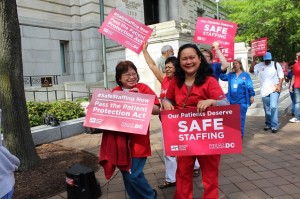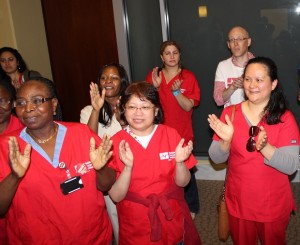Fil-Am nurses join demand for increased staffing in DC hospitals
• Marks International Nurses Day with rally demanding safer nurse-to-patient ratio
• Presses District Council to pass the Patient Protection Act

RNs Maria Ronquillo (left) and Teresa Nadal of the Veterans Affairs Medical Center march in front of the District of Columbia City Council offices to demand prompt action on a Patient Protection bill. PHOTOS BY JON MELEGRITO
WASHINGTON, DC — Maria Ronquillo usually sleeps during the day after working a 12-hour night shift at the Veterans Affairs Medical Center in the District of Columbia. But on May 12, the 54-year-old registered nurse decided to join other DC nurses and community allies for a morning rally in front of City Hall.
The event, a celebration of International Nurses Day, was also the birthday anniversary of Florence Nightingale, the 19th-century nurse who established the foundations of modern nursing. Her personal example of nursing the wounded during wartime and, later, in peacetime helped to improve medical care.
Along with other nurses from area hospitals, Ronquillo said they were marking Nightingale’s birthday by demanding prompt action by the District Council to pass the Patient Protection Act, now under consideration. The measure would require minimum numbers of nurse-to-patient ratios.
To put their point across more directly, the nurses personally met with city council officials in their offices, presenting them with a 24-page patient care report documenting 214 incidents of understaffing at six District hospitals and two government agencies over the past 15 years.
The report was compiled from “Assignment Despite Objection” (ADOs) forms filled out by nurses when they object to “an unsafe, or potentially unsafe, patient care assignment,” such as consistent inadequacy of staffing to meet the needs of patients.
“Skipping sleep is a small sacrifice,” Ronquillo said, who got off work at 7 a.m. for the 9 o’clock mass action. “I came today because the issues of high quality patient care and patient safety are very important to me, personally.”
In her 22 years at the VA hospital, Ronquillo knows how short staffing puts patients at risk. “I have experienced what it’s like, both as a nursing care giver and as a patient myself,” she said.
“I got very sick a while back and was confined in intensive care for weeks,” she recalled. “That’s when I realized how critical bedside care is, not only to patients who need round-the-clock attention but also to their families who want assurances that their loved ones are being cared for very well.”
A graduate of Siliman University and a native of Dumaguete City, Ronquillo said that bedside nurses like herself (unlike “clipboard nurses”) suffer lots of physical ailments, like back pains, and are constantly subjected to physical and mental stresses.
“If’s a very demanding profession, but we love it because it’s rewarding to see a person get healed and nursed back to good health,” Ronquillo explained.
Teresa Nadal, a co-worker of Ronquillo at the VA facilitiy, said adequate staffing is very critical in intensive care units. “I’ve been an ICU nurse for six years,” Nadal said. “The safest ratio is one nurse to two patients. But this is not the situation in most hospitals in town where there’s more than three patients are assigned to a nurse.”
Nadal, who grew up in Iriga City, Camarines Sur, and now lives with her husband and children in Wheaton, Maryland, said she took care of her grandparents until she came to the U.S. in 1996.
“I discovered the nurse in me caring for my family back home,” she added “There’s a lot of satisfaction in knowing you took good care of them.”
Ronquillo and Nadal are among the VA medical center’s staff of 1,700 providing care to over 50,000 veterans. They also handle more than 500,000 outpatient visits each year.
“Nurses cannot make mistakes,” pointed out Jeanette Calahong, an RN at the Neonatal Intensive Care Unit at the Washington Hospital Center since 2002.
“Even if our patient load is heavy, we have to push ourselves to
always maintain a high level of care. To fall short could be fatal to the patient. I could also lose my license because of mistakes caused by understaffing and overworked nurses,” Calahong explained.
The event at the City Council building coincided with a global day of action in 11 countries where nurses and healthcare workers jointly called for increased efforts to promote patient safety, protect health care services and ensure access to health care for all with a common theme of “Health Care is a Human Right.”
In the Philippines, the Alliance of Health Workers staged a major protest last week in Manila to stand up for health care workers against privatization.
